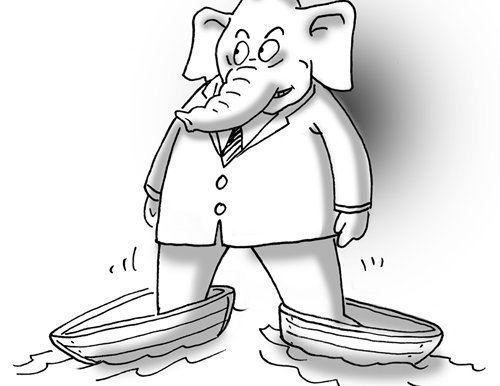
Chinese writer Cheng Xizhon said that despite the Doklam standoff and an Indian drone's intrusion into Chinese airspace, relations between Beijing and New Delhi in 2017 were not thrown off track, with conflicts under control.
He writes New Delhi's duplicity is reflected on a number of issues. For instance, while the country said earlier it will safeguard peace and stability in the border region, it stepped up its combat readiness along the frontier with China; while accepting Tibet as a part of China, it supports the Dalai Lama's separatist activities; while it claimed that "India and China have the responsibility to join hands and turn the 21st century into an Asian century," it is skeptical and suspicious of China-proposed Bangladesh-China-India-Myanmar Economic Corridor and the China-Nepal-India Economic Corridor that Chinese and Nepalese experts called for.
Full Article
India On the Wrong Path To Regional Hegemony
By Cheng Xizhong
Despite the Doklam standoff and an Indian drone's intrusion into Chinese airspace, relations between Beijing and New Delhi in 2017 were not thrown off track, with conflicts under control.
Indian External Affairs Minister Sushma Swaraj said earlier India has attached a high degree of importance to its relations with China and regarded bilateral ties as an important part of the country's foreign policy. She added that the two countries share far more similarities than differences and both should strengthen strategic communication and enhance strategic mutual trust.
The Sino-Indian relationship is a significant part of China's neighborhood diplomacy. In the past decades, Beijing has been dedicated to developing friendly ties with New Delhi. As two great ancient civilizations and emerging market economies, China and India shoulder the historical mission of development and rejuvenation. Therefore, the two countries are supposed to become natural partners in cooperation, constantly expand the positive side of bilateral relations and further garner the momentum of bilateral exchanges.
However, while India pledged to enhance strategic mutual trust with China, it repeatedly committed acts that jeopardized friendly ties.
Just a month after Swaraj vowed to enhance strategic communication and mutual trust with China, Indian Army Chief General Bipin Rawat publicly claimed that "China is a powerful country but we [India] are not a weak nation," and that India's "counterinsurgency operations will be shifted to northern areas this year."
New Delhi's duplicity is reflected on a number of issues. For instance, while the country said earlier it will safeguard peace and stability in the border region, it stepped up its combat readiness along the frontier with China; while accepting Tibet as a part of China, it supports the Dalai Lama's separatist activities; while it claimed that "India and China have the responsibility to join hands and turn the 21st century into an Asian century," it is skeptical and suspicious of China-proposed Bangladesh-China-India-Myanmar Economic Corridor and the China-Nepal-India Economic Corridor that Chinese and Nepalese experts called for.
Both China and India were once colonized and gained independence around the same time. Similar historical experiences determine their close ties and similarities in civilization and economic development. The two countries ought to be good friends.
Mutual strategic trust is the basis for the two nations to develop friendly ties, enhance economic and trade collaborations, raise the living standards of their people, and contribute to international development.
China and India have intense people-to-people ties. India should abandon its Cold-War mentality and regional hegemony, meet China half way and put in more efforts into societal and economic development so as to gradually shake off poverty.
India should strike sincere friendship with China and abandon the mentality that Beijing is its biggest rival. China is not a threat to India. The two countries ought to be partners. India should give up double standards and desist from jeopardizing its neighbor's core interests. Moreover, the country should look positively at China's good-intentioned infrastructural proposals for South Asia.
Rawat said earlier that "we cannot allow the neighborhood to be drifted away from us - whether it is Nepal, Bhutan, Myanmar, Bangladesh, Sri Lanka or Afghanistan … these nations have to be kept on board" as part of a broader strategy to deal with China.
This suggests that New Delhi is still pursuing its "Great Indian Dream" in the 21st century. India should understand that South Asian countries including Bhutan and Nepal are against India's regional hegemony, and it is New Delhi's endeavor to set up its sphere of influence in the region that has contributed to conflict with neighbors.
Although India has attached more importance to economic reforms and development since Narendra Modi came into office, it is still far behind China. India should abandon the stereotype mind-set against China and give up its intention of allying with the US, Japan and Australia to contain China. Cooperation with China and establishing mutual strategic trust is a prerequisite to India's development.
The author is a senior research fellow with the Charhar Institute and a member with the Chinese Association for South Asian Studies. opinion@globaltimes.com.cn
Courtesy: Global Times
- Nepal-China Aid Project Meeting Held In Lhasa
- Apr 25, 2024
- Ambassador Subedi Presented The Letter Of Credence To President Of Italy
- Apr 25, 2024
- Nepal-Qatar Joint Business Council Formed
- Apr 25, 2024
- Weather Forecast: Isolated Brief Rain Is Likely To Occur At Few Places Of Koshi, Sudurpaschim And Karnali
- Apr 25, 2024
- Qatar And Nepal Ink Several MoUs, Returned Home Completing Two Days Visit
- Apr 24, 2024
















